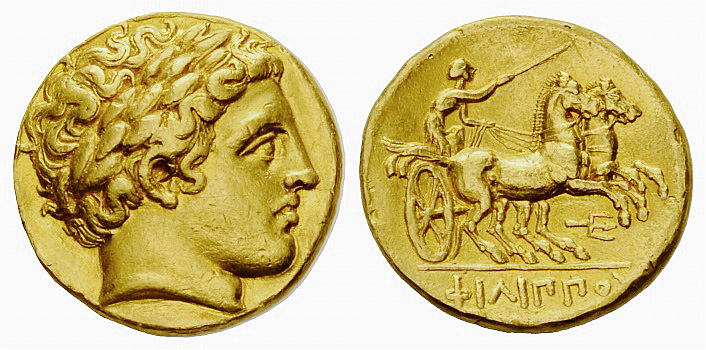H 97 - Amphipolis (Philip II), gold, staters (345-336 BCE)
From SILVER
345 BCE - 336 BCE Gold 2,172 kg
Description
| ObverseInscription or printing placed on the obverse.: | (Laureate head of Apollo right).Head of Apollo right, wearing laurel wreath. |
| ReverseInscription or printing placed on the reverse.: | ΦΙΛΙΠΠΟΥ (Greek).Charioteer driving biga right, trident head below horses |
Mint and issuing power
| MintIdentifies the place of manufacture or issue of a numismatic object.: | Amphipolis | Ancient regionAncient region.: | Macedon | Modern countryModern country: Greece | AuthorityIdentifies the issuing power. The authority can be "pretended" when the name or the portrait of X is on the coin but he/she was not the issuing power. It can also be "uncertain" when there is no mention of X on the coin but he/she was the issuing power according to the historical sources: | Philip II (Argead king, 359-336 BC), Macedonian kingdom |
Chronology
| FromIdentifies the initial date in a range assigned in a numismatic context. | 345 BCE | toIdentifies the final date in a range assigned in a numismatic context.. | 336 BCE | PeriodTime period of the numismatic object.: Classical and Hellenistic |
Physical description
| MetalThe physical material (usually metal) from which an object is made.: | Gold |
Median weightMedian of the weights of numismatic objects (in grams). in grams | 8.55 | DenominationTerm indicating the value of a numismatic object. Examples: tetradrachm, chalkous, denarius.: | stater |
StandardStandard.: | Attic |
Image

References
| Die study referencePublication of the study: | Le Rider 19771Le Rider 1977 | ||
| Coin series referenceReference to coin series study: | RQEMH2RQEMH, n° 97 | ||
Obverse dies distribution
| FrequencyFrequency of specimen in distribution. ᵖ | Number of obversesNumber of obverse dies. ᵖ (o) | % (o) | Number of coinsNumber of coins. (n) | % (n) | Die nameName(s) of the die(s). |
| 3 | 1 | 100 | 3 | 100 | 1 |
| Total | 1 of 1 | 100 | 3 of 3 | 100 |
Reverse dies distribution
no distribution is available
Quantification
| Number of obversesNumber of obverse dies. ᵖ (o) | 1 | Number of singletons (o1)The number of singleton coins. ᵖ | |
| Number of reverse diesNumber of reverse dies. (r) | 2 | Number of coinsNumber of coins. (n) | 3 |
| Coins per obverse dieNumber of coins per obverse die. (n/o) | 3 | Coins per reverse dieNumber of coins per reverse die. (n/r) | 1.5 |
| Reverse per obverse ratioRatio of obverse dies divided by reverse dies. (r/o) | 2 | Percentage of singletons (o1)number of coins (n) divided by the number of singletons (o1) ᵖ | % |
| Original number of dies (O) (Carter 1983 formula)The estimation of the number of coins according to Carter 1983 ᵖ | 1.27 | Coins struck if 20,000 as average productivity per dieCoins made if the average productivity for obverses (according to Carter) is 20,000. ᵖ | 25,400 |
| Original number of dies (O) (Esty 2011 formula)The estimation of the number of coins according to the singleton formula in Esty 2011 ᵖ (O) | 1.5 | Survival rate if 20,000 as average productivity per dieSurvival rate if average productivity is 20,000. ᵖ | 0.00012 |
| Coverage (o = % of O) (Esty 1984 formula)Esty 1984 - coverage (% of O) ᵖ (o = % of O) | % | Die productivity if survival rate 1/2,000Average productivity if survival rate is 1/2,000. ᵖ | 4,724.41 |
| Weight of silver (in kg) if 20,000 coins per die (O = Carter formula)Carter 1983 * Median weight * 20000 (*10 if gold or electrum) ᵖ | 2,172 kg <br /> 2,172 kg | Die productivity if survival rate 1/5,000Average productivity if survival rate is 1/5,000. ᵖ | 11,811.02 |
Remarks